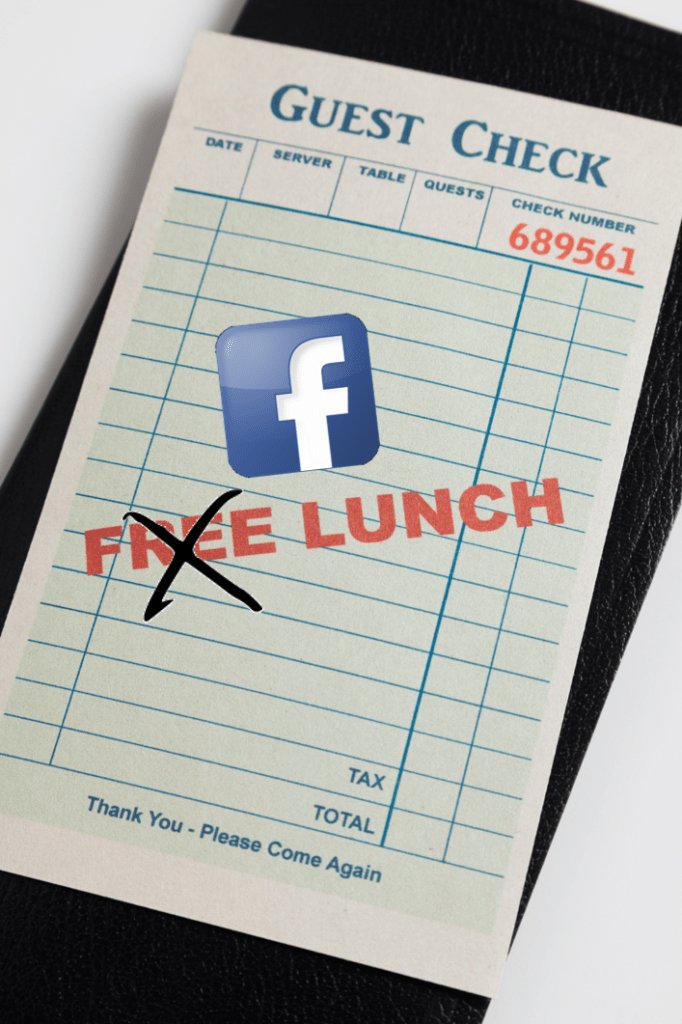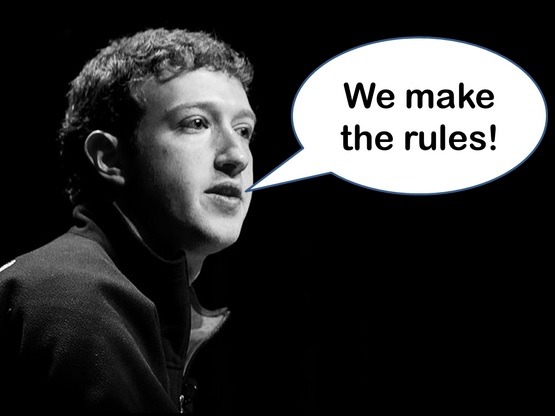Welcome to “Best of JacoBLOG,” a look back at some of the most-read blog posts of 2018. Today's installment is nearly a year old, first published this past January. And it reads like it was written five years ago because of all the noise that's impacted the world's social media colossus.
Facebook hasn't just hit a few speed bumps – its privacy policy, usage by political operatives, and other major issues – notably has led to the glaring lights of Congressional hearings for its founder, Mark Zuckerberg.
One year ago, no one would have been crass or crazy enough to question Facebook's future. But today, it a conversation starter. We'll be looking at the consumer reaction to Facebook in our upcoming Techsurvey 2019, launching just after the near year.
Enjoy today's post, and don't forget the social media rules are still being written. – FJ

Mark Zuckerberg has never been shy about changing his own rules. From Facebook's beginnings, his team has continually tweaked the model, often launching changes, updates, and modifications – almost always without a heads-up or warning.
But of course, that's his prerogative. He's the landlord, the boss man, the kahuna. And he can do whatever he pleases to ensure his mega-social machine stays on top, fending off the competition, or in the case of Instagram and WhatsApp, going out and buying them.
But sometimes, businesses – including radio companies – forget the obvious. Facebook is fun, it's interactive, and oh, by the way – it works. It drives traffic, it sells products, and it turns people onto news stories, memes, photos, and other content.

So, for publishers on Facebook, there are two key rules:
- Facebook makes the rules
- If you don't like a new Facebook policy, refer to rule #1
As is their right, Facebook did an about-face last week, refocusing its massive platform on what they now call “meaningful interaction.”
Translation: That means the effectiveness of “your” brand's Facebook page is going to change…soon. Of course, even the experts are guessing about how the newly revamped algorithm will punish companies that have enjoyed a free pass on Facebook. But it's going to happen, and it means all that posting your station does will not have the reach and impact it once did. There have been vague directives in the past, but this new initiative provides more philosophical clarity.
Some will cry “Unfair!”
After all, consider how much “free advertising” the radio industry (and everyone else) has provided Facebook over the last decade or so. That has to be worth something, right?
In truth, Facebook has provided great value for many radio and personality brands, especially in an era when many station marketing budgets have been no more robust than the coffee fund.
But the value of Facebook to brands is definitely going to diminish.
So what's driving this change of heart? It's hard to know precisely what is changing Mark Zuckerberg's state of mind, but we can speculate. It could be all the “fake news” posts that were purchased during the last election, along with revelations that even Facebook doesn't know the full extent its platform has been compromised by bad actors in recent years. From hate speech to foreign disruption, Facebook – and by extension, Zuckerberg – has had a tough year.
And that means going back to the basics. A recent story in The New York Times by Mike Isaac frames up Zuckerberg's new thinking – a return to the original purpose of the social network:
“We want to make sure that our products are not just fun, but are good for people.”
So, all the different ways your station has been using Facebook to drive traffic back to your website, your air, your podcasts, and your videos are going to be trumped by photos and posts about cats, kids, gossip, anniversaries, and back-to-the-basics interaction with friends and family.
In the same article, Zuckerberg suggests the last several months have been times of reflection for the Facebook inner circle. And while this throwback policy will cause Facebook some financial angst. Bloomberg estimates a lowered stock price has cost him north of $3 billion, but alas, he can afford to take a hit.
In his mind, the greater good is to…do good. Here it is, directly from Zuckerberg:
“What are we really here to do? If what we're here to do is help people build relationships, then we need to adjust.”
And by extension, so will all of us. Our digital team members, our talent, our sales staff, and our marketers are going to have to return to their own basics. That's because the Facebook free lunch is over.
Nearly four years ago when Lori Lewis was our Director of Social Media, this blog addressed this same topic. Lori wrote the insightful post linked below, suggesting brands not depend on Facebook policies in order to survive and thrive. I've linked it below so you can see we were espousing this same message back in the Obama era. It's a good read, and still relevant as Facebook recasts itself yet again:
And it's not just Facebook. An over-reliance on any platform where radio is paying little to nothing for exposure and promotion can be a slippery slope. As we've learned in recent years, Apple can – and does – change its app policies, Amazon continues to rejigger its Alexa rules, Google will inevitably do the same with its smart speaker line, and YouTube can institute new policies whenever it likes.
And so that means not losing focus on your most important assets – the ones you own, not the ones like Facebook that you “rent.”
Your website, your podcasts, your talent (assuming they're under contract), your brand, your license – these are all things you're stewarding on behalf of your company. You control most if not all of these (OK, there is the FCC), and while some of these other so-called assets may get changed as arbitrarily as homeowners association rules, your true equity is most deserving of research, development, and further investment.
The Facebook rules change is a reminder that broadcasters need to take stock of their proprietary content and distribution outlets, rather than letting Mark Zuckerberg, Tim Cook, and Jeff Bezos control your digital destiny.
In a recent AllAccess story, Lori offers good advice about how brands might still be able to derive benefit from their Facebook pages. It will apparently come down to stimulating conversation rather than promoting your ticket giveaways and sales remotes. But even she doesn't know precisely how all this will play out. Just like with the IRS, Nielsen, and
And that's why, a re-emphasis on your own house, your proprietary assets, your direct line of communication to your audience (and your advertisers) may, in fact, be the lesson that emerges from this.
The Facebook free lunch is over.
Check please.
- Get Your Free Radio Ads? Take It To the Bank! - April 19, 2024
- You've Got A Face For Radio - April 18, 2024
- What's Your Radio Station's Response To AI? - April 16, 2024






Leave a Reply